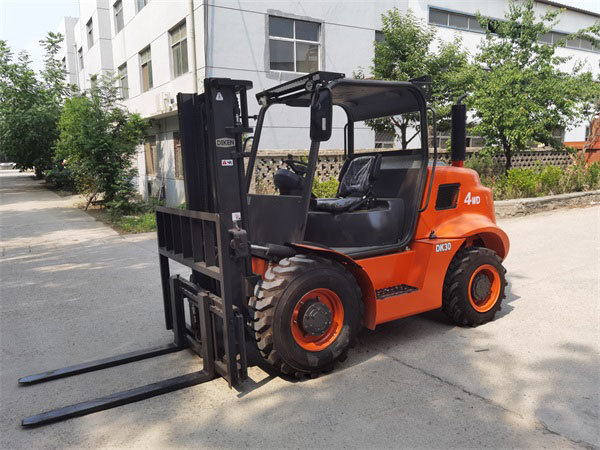Diken news
All Terrain Forklifts: The Ultimate Solution for Challenging Agricultural Environments
Release time: 2025-04-17
All Terrain Forklifts: The Ultimate Solution for Challenging Agricultural Environments
In the ever-evolving world of agriculture, efficiency and adaptability are paramount. As agricultural operations expand and diversify, the need for robust equipment that can handle challenging environments has never been greater. Enter all terrain forklifts, a versatile solution tailored for farmers and agricultural businesses facing the rigors of rugged landscapes. These machines not only enhance productivity but also ensure safety and reliability in difficult conditions.
Table of Contents
- Understanding All Terrain Forklifts
- Key Features and Benefits of All Terrain Forklifts
- Applications of All Terrain Forklifts in Agriculture
- Choosing the Right All Terrain Forklift for Your Needs
- Maintenance and Care for All Terrain Forklifts
- Cost-Effectiveness and ROI of All Terrain Forklifts
- Safety Considerations When Using All Terrain Forklifts
- The Future of All Terrain Forklifts in Agriculture
- FAQs About All Terrain Forklifts
Understanding All Terrain Forklifts
All terrain forklifts, also known as rough terrain forklifts, are specialized vehicles designed to operate in challenging conditions, such as uneven ground, mud, and gravel. Unlike standard forklifts, these machines are equipped with larger tires, powerful engines, and enhanced suspension systems, allowing them to traverse difficult terrains with ease.
These forklifts are typically powered by diesel engines, providing the necessary torque and power to lift heavy loads in demanding environments. The robust construction and advanced design make them indispensable for agricultural operations where traditional forklifts might struggle.
Key Features and Benefits of All Terrain Forklifts
Enhanced Mobility and Stability
One of the standout features of all terrain forklifts is their ability to maintain stability on uneven surfaces. The larger tires and advanced suspension systems absorb shocks and provide traction, enabling these machines to navigate steep inclines and soft grounds. This feature significantly reduces the risk of tipping over, which is a common concern in agriculture.
Versatility in Handling Different Loads
All terrain forklifts come with adjustable forks and attachments that allow for the handling of various load types, from pallets of produce to heavy machinery. This versatility makes them invaluable on multi-faceted farms where operations range from crop harvesting to equipment transport.
Improved Efficiency and Productivity
By integrating all terrain forklifts into agricultural operations, farmers can drastically reduce the time required for material transport. These machines can operate faster than manual labor, allowing for quicker loading and unloading processes, ultimately leading to increased productivity.
Applications of All Terrain Forklifts in Agriculture
Crop Handling and Transportation
All terrain forklifts are ideal for moving crops from fields to storage areas. Their ability to navigate uneven terrain means they can be utilized in various agricultural settings, including orchards and vineyards. This efficiency not only speeds up the harvest process but also minimizes crop damage during transportation.
Equipment Transportation
Farms often require the relocation of heavy machinery across challenging landscapes. All terrain forklifts can facilitate this movement, reducing wear and tear on other vehicles and ensuring that equipment is moved quickly and safely throughout the farm.
Loading and Unloading Deliveries
Deliveries to and from farms often involve rough terrain, which can pose challenges for standard forklifts. All terrain forklifts excel in these situations, efficiently loading and unloading shipments regardless of ground conditions.
Choosing the Right All Terrain Forklift for Your Needs
Assessing Your Requirements
When selecting an all terrain forklift, it’s crucial to assess your specific needs. Consider the types of loads you will be handling, the terrain conditions, and the height requirements for lifting. This evaluation will help you determine the appropriate lifting capacity and features required.
Brand and Model Considerations
Different brands offer various models of all terrain forklifts, each with unique features. Researching brands known for reliability, customer service, and warranty options can help you make a well-informed decision. Popular brands often include JCB, CAT, and Hyster, each providing a range of models tailored for agricultural use.
Maintenance and Care for All Terrain Forklifts
Regular Inspections
To ensure optimal performance and longevity of your all terrain forklift, regular inspections are necessary. Check tire pressure, fluid levels, and the overall condition of the machine before use. Regular maintenance can prevent costly repairs and downtime.
Cleaning and Storage
Post-operation cleaning is essential to remove dirt, mud, and debris that can interfere with the forklift's functionality. Proper storage indoors, away from extreme weather conditions, can also help extend the life of the machine.
Cost-Effectiveness and ROI of All Terrain Forklifts
Initial Investment vs. Long-Term Benefits
While the initial investment in an all terrain forklift may seem substantial, the long-term benefits often outweigh the costs. Enhanced productivity, reduced labor costs, and increased safety can lead to a significant return on investment (ROI) over time.
Financing Options
Many agricultural businesses can benefit from financing options available for purchasing all terrain forklifts. Exploring leasing, loans, or dealer financing can make acquiring this essential equipment more manageable.
Safety Considerations When Using All Terrain Forklifts
Operator Training
Proper training is critical for forklift operators to ensure safe handling practices. Conducting regular training sessions and safety drills can help minimize accidents and improve overall safety on the farm.
Safety Features
When selecting an all terrain forklift, consider models equipped with safety features such as seat belts, rollover protection systems, and alarms. These features enhance operator safety and reduce the likelihood of accidents in challenging environments.
The Future of All Terrain Forklifts in Agriculture
As technology advances, the future of all terrain forklifts looks promising. Innovations such as electric models, telematics, and automation are beginning to emerge, offering greater efficiency and sustainability. Adopting these technologies can further enhance agricultural operations while reducing environmental impact.
FAQs About All Terrain Forklifts
1. What is the weight capacity of an all terrain forklift?
The weight capacity varies by model, typically ranging from 2,500 to 10,000 pounds. Always refer to the manufacturer's specifications for precise information.
2. Can all terrain forklifts operate in wet conditions?
Yes, all terrain forklifts are designed for wet and muddy conditions, making them suitable for various agricultural environments.
3. How often should I service my all terrain forklift?
Regular service is essential, and it is recommended to perform inspections every 250 hours of operation to ensure optimal performance.
4. Are all terrain forklifts fuel-efficient?
Many modern all terrain forklifts are designed with fuel efficiency in mind, and selecting models with advanced engines can help reduce fuel consumption.
5. What are the best practices for using an all terrain forklift?
Best practices include ensuring proper operator training, conducting regular inspections, and adhering to weight limits to ensure safety and efficiency.
Conclusion
All terrain forklifts represent a critical advancement in agricultural machinery, providing farmers with the tools they need to thrive in challenging environments. By enhancing mobility, ensuring safety, and increasing productivity, these versatile machines are proving to be an indispensable asset in modern agricultural operations. Investing in an all terrain forklift not only streamlines operations but also prepares farms for a future characterized by innovation and growth.
Keywords: all terrain forklift










